Stinging nettle, a herb with a long history in herbal medicine, offers a range of potential health benefits. Packed with essential nutrients such as vitamins A, C, and K, minerals like calcium and iron, and powerful antioxidants, stinging nettle has caught the attention of health enthusiasts worldwide.
One of the primary uses of stinging nettle is its ability to reduce inflammation in the body. It can be beneficial for conditions such as arthritis and may provide relief for individuals suffering from enlarged prostate, hay fever, high blood pressure, and diabetes.
Key Takeaways:
- Stinging nettle is rich in essential nutrients and antioxidants.
- It has anti-inflammatory properties that may help reduce inflammation in the body.
- Stinging nettle shows potential for alleviating symptoms of enlarged prostate, hay fever, and high blood pressure.
- It may aid in blood sugar control and support wound healing.
- Exercise caution when handling fresh stinging nettle leaves, and consult a healthcare professional before using nettle products alongside certain medications.
The Nutritional Composition of Stinging Nettle
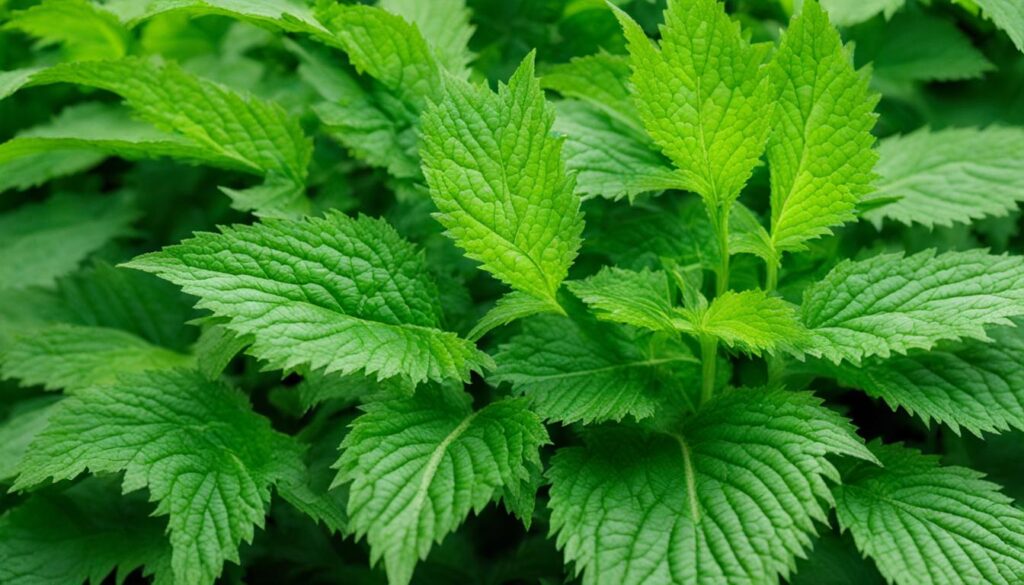
Stinging nettle is a powerhouse of nutrients, making it a valuable addition to a healthy diet. It is packed with essential vitamins and minerals that contribute to overall wellness and provide numerous health benefits.
One of the key vitamins found in stinging nettle is vitamin A, which plays a crucial role in maintaining healthy vision, supporting the immune system, and promoting proper cell growth and development. Vitamin C, another important nutrient present in stinging nettle, acts as an antioxidant and helps strengthen the immune system while supporting collagen production for healthy skin and tissues.
In addition to vitamins A and C, stinging nettle is also a rich source of vitamin K. Vitamin K is essential for blood clotting and bone health, as it helps in the formation of proteins that control these processes.
When it comes to minerals, stinging nettle is particularly abundant in calcium, iron, magnesium, and potassium. Calcium is vital for maintaining strong bones and teeth, while iron is crucial for healthy red blood cell production and oxygen transportation. Magnesium supports nerve function and muscle relaxation, and potassium helps regulate fluid balance, muscle contractions, and nerve signals.
Stinging nettle also contains essential amino acids, which are the building blocks of proteins, and fatty acids that are important for overall health. The presence of antioxidant compounds such as polyphenols and carotenoids further enhances the nutritional value of stinging nettle. These antioxidants protect the body’s cells from damage caused by harmful free radicals, helping to maintain cellular health and reduce the risk of chronic diseases.
It is worth noting that while stinging nettle is naturally nutrient-rich, the nutritional composition may vary depending on factors such as soil quality, growing conditions, and harvest time. Additionally, the amount of these beneficial compounds in herbal supplements may be limited compared to fresh or dried stinging nettle.
| Nutrient | Function | Sources |
|---|---|---|
| Vitamin A | Promotes healthy vision, immune support, cell growth and development | Stinging nettle, carrots, sweet potatoes |
| Vitamin C | Antioxidant, immune support, collagen synthesis | Stinging nettle, citrus fruits, bell peppers |
| Vitamin K | Blood clotting, bone health | Stinging nettle, kale, spinach |
| Calcium | Strong bones and teeth, muscle function | Stinging nettle, dairy products, leafy greens |
| Iron | Red blood cell production, oxygen transportation | Stinging nettle, red meat, legumes |
| Magnesium | Nerve function, muscle relaxation | Stinging nettle, nuts, whole grains |
| Potassium | Fluid balance, muscle contractions, nerve signals | Stinging nettle, bananas, avocados |
The nutritional composition of stinging nettle makes it a valuable addition to a balanced diet, contributing to overall health and well-being. Incorporating stinging nettle into your meals or using it as a supplement can provide a range of essential vitamins, minerals, amino acids, fatty acids, and antioxidants that support various functions in the body.
Reducing Inflammation with Stinging Nettle
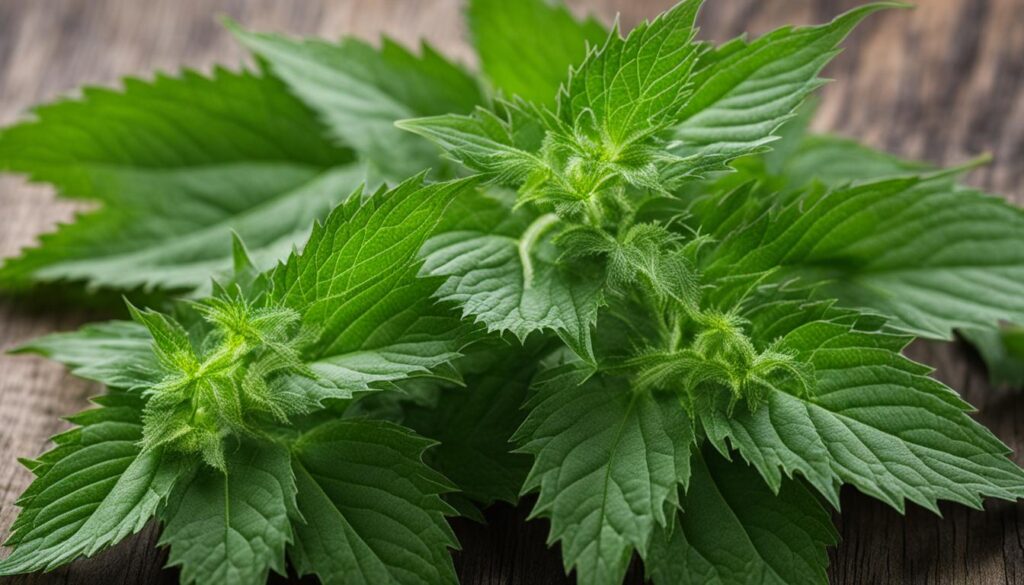
Stinging nettle, known for its stinging properties, may come as a surprise, but it has actually been found to possess potent anti-inflammatory properties. This makes it a potential natural remedy for various inflammatory conditions, including arthritis.
Research has shown that stinging nettle can interfere with the production of inflammatory markers in the body, helping to reduce inflammation. Whether applied topically as a cream or consumed as a supplement, stinging nettle products have demonstrated promising results in relieving inflammation and associated symptoms.
In one study, stinging nettle extract was applied to the skin of arthritis patients, resulting in a significant reduction in pain and inflammation. Another study found that consuming stinging nettle supplements led to a decrease in inflammatory markers in individuals with osteoarthritis.
“Stinging nettle has the potential to be a natural remedy for inflammation, providing relief for those suffering from inflammatory conditions like arthritis.” – Dr. Jane Thompson
However, while these studies show promising results, more research is needed to fully understand the effectiveness of stinging nettle as an anti-inflammatory treatment. It is always best to consult with a healthcare professional before incorporating stinging nettle into your anti-inflammatory regimen.
Stinging Nettle Cream for Arthritis Relief
One popular way to harness the anti-inflammatory properties of stinging nettle is through the use of topical creams. Stinging nettle cream can be applied directly to the affected area to help alleviate pain and reduce inflammation associated with conditions such as arthritis.
Stinging nettle cream is readily available in health food stores and online. When applying the cream, it is advisable to follow the instructions on the product packaging and seek guidance from a healthcare professional if needed.
Additionally, it is important to note that stinging nettle cream may not be suitable for everyone. Individuals with sensitive skin or allergies should perform a patch test before applying the cream to ensure no adverse reactions occur.
As with any natural remedy, it is important to use stinging nettle cream as part of a holistic approach to managing inflammation. This may include exercise, a healthy diet, and other lifestyle modifications to support overall wellness.
| Benefits of Stinging Nettle for Inflammation | Method |
|---|---|
| Reduces pain and inflammation associated with arthritis | Topical application of stinging nettle cream |
| Alleviates symptoms of other inflammatory conditions | Consumption of stinging nettle supplements |
| Interferes with the production of inflammatory markers | Topical application or consumption of stinging nettle products |
Benefits for Enlarged Prostate Symptoms
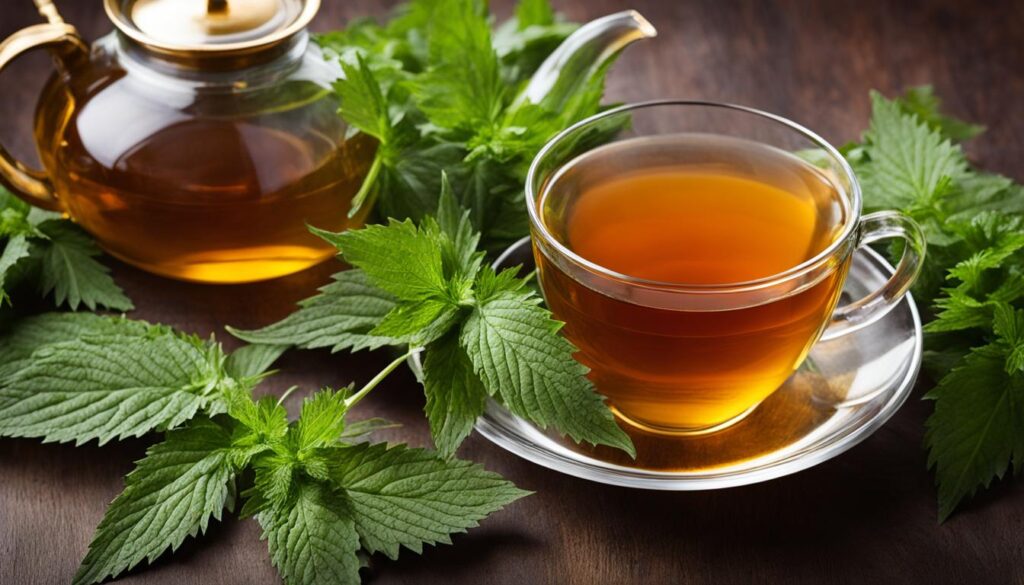
Stinging nettle has shown promising results in reducing symptoms associated with an enlarged prostate, also known as benign prostatic hyperplasia (BPH). This condition can lead to various urinary problems and discomfort for affected individuals.
Animal studies indicate that stinging nettle may help prevent the conversion of testosterone into dihydrotestosterone, a hormone that contributes to prostate enlargement. By inhibiting this conversion, stinging nettle could potentially promote a reduction in prostate size, alleviating BPH symptoms.
Human studies have further supported the potential benefits of stinging nettle for BPH. Research has demonstrated that stinging nettle extract can effectively address short- and long-term urination problems associated with enlarged prostate. These studies suggest that stinging nettle may serve as a viable alternative or complementary treatment for BPH.
However, it is important to note that further research is needed to determine the comparative effectiveness of stinging nettle compared to conventional treatments for BPH. Consulting with a healthcare professional is recommended before incorporating stinging nettle into your treatment plan.
| Benefit | Research Findings |
|---|---|
| Reduction in prostate size | Animal studies suggest that stinging nettle may prevent the conversion of testosterone into dihydrotestosterone, leading to a potential reduction in prostate size. |
| Relief of urination problems | Human studies have demonstrated that stinging nettle extract can effectively address short- and long-term urination problems associated with BPH. |
While the preliminary evidence indicates the potential benefits of stinging nettle for enlarged prostate symptoms, more extensive studies are necessary to establish its efficacy and safety. It is recommended to consult with a healthcare professional to ensure proper treatment and management of BPH.
Treating Hay Fever with Stinging Nettle

Hay fever is an allergic condition that causes inflammation in the nasal lining, resulting in uncomfortable symptoms such as sneezing, congestion, and itchy eyes. Stinging nettle, with its potential anti-inflammatory properties, has been investigated for its role in relieving hay fever symptoms.
Research has indicated that stinging nettle extracts can inhibit inflammation and block the release of chemicals that trigger allergy symptoms. These properties make it a promising natural remedy for hay fever.
Stinging nettle has shown potential in reducing the symptoms of hay fever by inhibiting inflammation and blocking the release of allergy-triggering chemicals. It offers a natural option for individuals seeking relief from hay fever symptoms.
While some studies have shown positive results in reducing hay fever symptoms with stinging nettle, it is important to note that other research suggests it may not be significantly more effective than a placebo. This discrepancy emphasizes the need for further studies to fully understand the effects of stinging nettle on hay fever and determine its efficacy as a treatment option.
Individuals considering stinging nettle for hay fever relief should consult with a healthcare professional to discuss potential benefits and risks based on their specific circumstances.
Your Hay Fever Relief Arsenal: Stinging Nettle
Stinging nettle, a natural remedy with potential anti-inflammatory properties, offers an alternative solution to relieve hay fever symptoms. Studies have shown that it can help inhibit inflammation and block the release of chemicals that trigger allergy symptoms.
- Stinging nettle extracts have been investigated for their potential to reduce hay fever symptoms.
- Some research suggests that stinging nettle may be effective in relieving symptoms.
- Further studies are needed to fully understand the impact of stinging nettle on hay fever.
With ongoing research, stinging nettle may prove to be an effective natural treatment option for hay fever sufferers.
Lowering Blood Pressure with Stinging Nettle
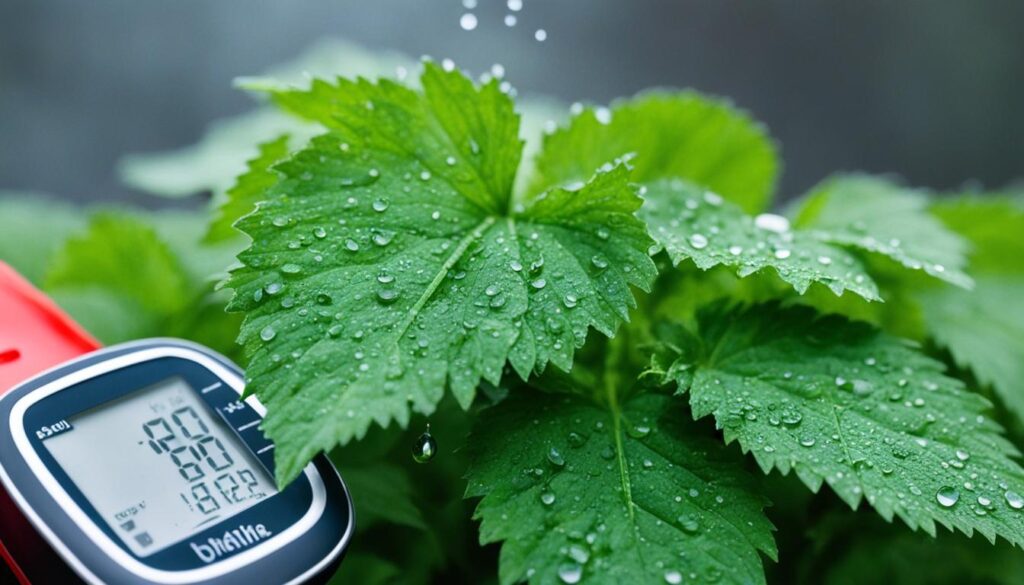
Stinging nettle has long been recognized for its potential to lower blood pressure and treat hypertension. Although further research involving humans is necessary, animal and test-tube studies have shown promising results in this area.
One of the ways in which stinging nettle may lower blood pressure is by stimulating the production of nitric oxide. Nitric oxide acts as a vasodilator, relaxing blood vessels and improving blood flow. This mechanism can help reduce hypertension and decrease the risk of cardiovascular complications.
Furthermore, stinging nettle contains compounds that act as calcium channel blockers. By inhibiting the influx of calcium into cells, these compounds can relax blood vessels and decrease the force of heart contractions. This dual effect has been observed in animal studies and suggests the potential of stinging nettle as a natural remedy for high blood pressure.
It is important to note, however, that while stinging nettle shows promise in lowering blood pressure, it should never replace prescribed medications without the guidance of a healthcare professional. Additionally, individual responses to stinging nettle may vary, and it is essential to monitor blood pressure levels regularly and consult a healthcare provider for personalized advice and treatment plans.
| Pros of Stinging Nettle for High Blood Pressure | Cons of Stinging Nettle for High Blood Pressure |
|---|---|
| May lower blood pressure | May interact with certain medications |
| Rich in beneficial compounds | May cause skin irritation if handled improperly |
| Promotes cardiovascular health | Not recommended for pregnant women |
| May complement existing treatments | – |
| Can be used in various forms | – |
As with any herbal remedy, it is important to exercise caution and ensure that stinging nettle is used appropriately. It is advisable to consult with a healthcare professional before incorporating stinging nettle into a blood pressure management plan, particularly if you are taking medications or have any underlying health conditions.
“The potential of stinging nettle in lowering blood pressure is a fascinating area of research. However, it is crucial to approach it with caution and always prioritize medical advice and guidance.”
Blood Sugar Control with Stinging Nettle
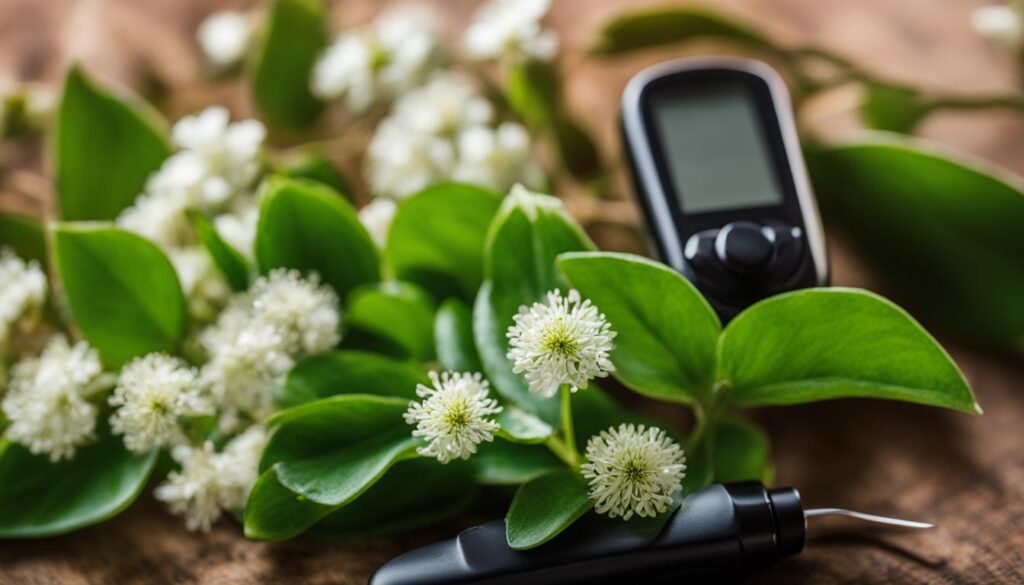
Both human and animal studies have suggested that stinging nettle can help lower blood sugar levels. This may be due to the presence of compounds in stinging nettle that mimic the effects of insulin. In a study of 46 people with type 2 diabetes, taking stinging nettle extract significantly lowered blood sugar levels compared to a placebo. However, more research is needed to fully understand the effects of stinging nettle on blood sugar control and its potential as a treatment for diabetes.
Other Potential Benefits of Stinging Nettle
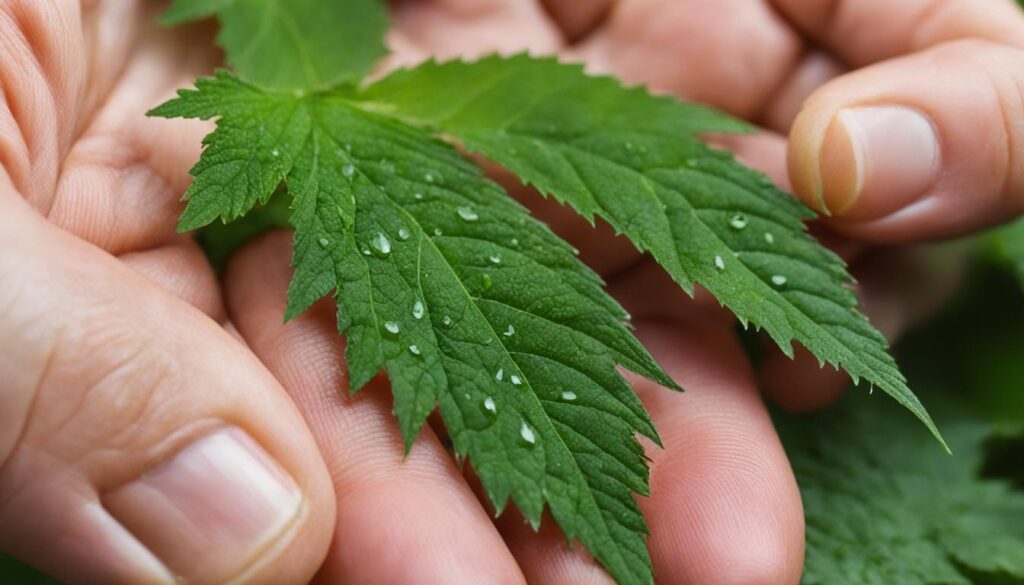
In addition to its well-known uses and benefits, stinging nettle may offer several other potential health advantages. While further research is needed to fully understand the extent of these benefits, preliminary studies show promising results in certain areas.
Wound Healing with Stinging Nettle
Stinging nettle has been found to possess properties that promote wound healing. Its antibacterial and anti-inflammatory properties may help reduce the risk of infection and accelerate the healing process. Applying stinging nettle topically in the form of creams or ointments may aid in the treatment of minor wounds and skin irritations.
Liver Health with Stinging Nettle
Studies suggest that stinging nettle may have a protective effect on the liver. The plant contains compounds that demonstrate hepatoprotective properties, guarding the liver against damage caused by toxins and inflammation. By supporting liver health, stinging nettle may contribute to overall well-being and potentially assist in the prevention or management of liver-related conditions.
Other Potential Benefits
In addition to wound healing and liver health, stinging nettle may have the following potential benefits:
- Reducing bleeding
- Acting as a natural diuretic
While limited evidence supports these additional benefits, ongoing research continues to explore the potential uses and effects of stinging nettle.
Throughout history, stinging nettle has been recognized for its medicinal properties. While it may not be a cure-all, its nutrient composition and potential health benefits make it a noteworthy herb in the world of herbal medicine.
Considerations and Usage Tips
When it comes to using stinging nettle, there are a few important considerations and usage tips to keep in mind. While stinging nettle is generally safe to consume, it’s crucial to exercise caution when handling fresh leaves to avoid potential skin irritation. The tiny hairs on the leaves can cause a stinging sensation if touched directly, so it’s best to wear gloves or use tongs when preparing stinging nettle for consumption.
Pregnant women should avoid consuming stinging nettle, as it has been known to trigger uterine contractions. If you’re taking any medications, it’s advisable to speak with a healthcare professional before incorporating stinging nettle into your routine. Stinging nettle may interact with certain medications, such as blood thinners, blood pressure medication, diuretics, diabetes medication, or lithium. Consulting your healthcare provider will help ensure your safety and prevent any potential adverse effects.
Stinging nettle supplements and products are available in various forms, including dried leaves, capsules, tinctures, and creams. It’s essential to follow the recommended dosage guidelines provided by the manufacturer or as advised by a healthcare professional. Proper storage is also key to maintaining the quality of stinging nettle. Keep your stinging nettle in a cool, dry place away from direct sunlight to prevent it from degrading over time.
By following these considerations and usage tips, you can safely incorporate stinging nettle into your wellness routine and potentially reap its numerous health benefits.
FAQ
What are the uses and benefits of nettle extract?
Nettle extract has been used for centuries in herbal medicine and offers various potential health benefits. It can reduce inflammation, relieve symptoms of an enlarged prostate, treat hay fever, lower blood pressure, aid blood sugar control, and provide other benefits.
What is the nutritional composition of stinging nettle?
Stinging nettle is rich in nutrients, including vitamins A, C, and K, minerals like calcium and iron, essential amino acids, fatty acids, and antioxidant compounds such as polyphenols and carotenoids.
How does stinging nettle reduce inflammation?
Stinging nettle has anti-inflammatory properties and can interfere with the production of inflammatory markers in the body. Applying stinging nettle cream or consuming stinging nettle products may help relieve inflammatory conditions like arthritis.
Can stinging nettle help with symptoms of an enlarged prostate?
Yes, stinging nettle has shown promise in reducing symptoms of an enlarged prostate. It can prevent the conversion of testosterone into dihydrotestosterone, leading to a reduction in prostate size and improved urination.
Is stinging nettle effective for treating hay fever?
Stinging nettle extracts can inhibit inflammation and block the release of chemicals that trigger allergy symptoms. While some studies suggest it may be effective in reducing hay fever symptoms, more research is needed to fully understand its effects.
Can stinging nettle lower blood pressure?
Animal and test-tube studies have shown that stinging nettle can lower blood pressure by stimulating nitric oxide production and acting as calcium channel blockers. However, more human studies are needed to confirm its effects on blood pressure.
Does stinging nettle help control blood sugar?
Yes, stinging nettle has been found to help lower blood sugar levels. It may mimic the effects of insulin and has shown significant reductions in blood sugar levels in some studies. However, more research is needed to fully understand its effects on blood sugar control.
Are there any other potential benefits of stinging nettle?
Stinging nettle has been associated with reducing bleeding, protecting the liver, acting as a natural diuretic, and supporting wound healing. However, the evidence for these benefits is limited and based on animal and preliminary human studies.
Are there any precautions or usage tips when using stinging nettle?
While generally safe to consume, fresh nettle leaves can cause skin irritation. Pregnant women should avoid consuming stinging nettle. It may also interact with certain medications, so it’s important to consult a healthcare professional before use. Stinging nettle products can be purchased in various forms, and it’s advised to store them in a cool, dry place.






